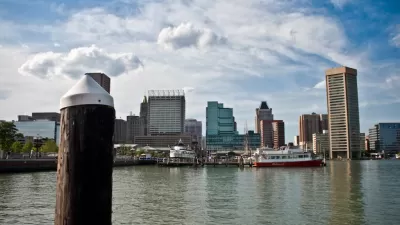A local marina owner's plan to build a floating marsh in Baltimore's Inner Harbor to help clean up the city's main tourist attraction is being viewed skeptically by officials, who have raised a number of questions and concerns.
Inspired by experimental wetlands placed in the harbor two years ago, local "marina magnate" Dan Naor has proposed what he believes could be a critical step in helping to clean up the foul smelling and trash-strewn environment in which he runs his businesses, reports Timothy Wheeler. He would like to build floating beds of rosemallow, sea lavender and salt grass in water that he controls, along with a walkway and viewing platforms.
According to Wheeler, it's this last element that has federal, state and city officials concerned. "Jay Apperson, spokesman for the Maryland Department of the Environment,
said state officials generally favor building floating wetlands, but
want to avoid or minimize any environmental impacts from building piers
and platforms over the water."
"'It's a neat concept,' said Thomas J. Stosur, the city's planning
director. But City Hall wants to be sure the harbor's first large
floating wetland is done in a way that doesn't interfere with continued
development of the Inner Harbor waterfront."
FULL STORY: Large harbor floating wetland project stirs debate

Planetizen Federal Action Tracker
A weekly monitor of how Trump’s orders and actions are impacting planners and planning in America.

Maui's Vacation Rental Debate Turns Ugly
Verbal attacks, misinformation campaigns and fistfights plague a high-stakes debate to convert thousands of vacation rentals into long-term housing.

Restaurant Patios Were a Pandemic Win — Why Were They so Hard to Keep?
Social distancing requirements and changes in travel patterns prompted cities to pilot new uses for street and sidewalk space. Then it got complicated.

In California Battle of Housing vs. Environment, Housing Just Won
A new state law significantly limits the power of CEQA, an environmental review law that served as a powerful tool for blocking new development.

Boulder Eliminates Parking Minimums Citywide
Officials estimate the cost of building a single underground parking space at up to $100,000.

Orange County, Florida Adopts Largest US “Sprawl Repair” Code
The ‘Orange Code’ seeks to rectify decades of sprawl-inducing, car-oriented development.
Urban Design for Planners 1: Software Tools
This six-course series explores essential urban design concepts using open source software and equips planners with the tools they need to participate fully in the urban design process.
Planning for Universal Design
Learn the tools for implementing Universal Design in planning regulations.
Heyer Gruel & Associates PA
JM Goldson LLC
Custer County Colorado
City of Camden Redevelopment Agency
City of Astoria
Transportation Research & Education Center (TREC) at Portland State University
Jefferson Parish Government
Camden Redevelopment Agency
City of Claremont




























